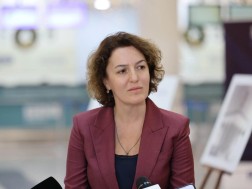Professors from 65 leading universities around the world call on Kobak...
"We urge the government to rethink this educationally harmful proposal
and to engage with allstakeholders in Georgia’s higher educational
system" - This is stated in the letter from foreign professors to
Irakli Kobakhidze, Prime Minister of Georgia."On October 16, you
announced a National Reform Concept for Higher Education, consisting
of seven major components. In this document and in your speech, you
and your government assure Georgian citizens that the National Reform
Concept will improve efficiency and quality in Georgian higher
education and promote equal access for students. We agree there are
longstanding problems in the Georgian higher educational system:
universities and institutes are nder-resourced (in 2025, Georgian
government spending on higher education was 0.3% of GDP); faculty are
underpaid, working two to three jobs to feed their families;
government supported research and scientific laboratories have become
practically non-existent; and unemployment among university graduates
stimulates a massive out-migration abroad every year.The measures you
propose in the National Reform Concept for Higher Education will not
solve any of these problems. Rather, they will increase government
control over the higher educational sector. Management will be placed
in the hands of rectors and administrators beholden to the government.
University autonomy, and with it, faculty control over academic
programs and curricula will be severely weakened. University budgets
will be reduced even further, and the removal of dissenting faculty
will become easier as part of the reorganization. The “reform”
will close the last sphere in Georgia which is open to healthy
dissent. A well-functioning university system which incorporates
critical thinking, selfgovernment, academic freedom, well-funded
research opportunities, and international exchange is vital to growing
the Georgian national economy. Without universities where information
is freely shared and research freely pursued, the Georgian economy
will not thrive.We are international scholars from universities around
the world. We are concerned about other measures undertaken by your
government which have led to the imprisonment of faculty and students
for peacefully defending their rights. Your proposed National Reform
Concept for Higher Education will not only nullify Georgia’s
democratic progress but will limit the prospects of your citizens, who
you were elected to represent. Higher education provides the state
with engaged citizens and professionals, who along with working
people, will ensure the country’s survival and prosperity in an
increasingly competitive global order.We urge the government to
rethink this educationally harmful proposal and to engage with all
stakeholders in Georgia’s higher educational system to create a
genuine reform that will improve the lives of Georgian citizens and
those of their children", - It is stated in the letter signed by:1.
Professor Stephen Jones, Davis Center, Harvard University2. Professor
Ronald Suny (Emeritus), University of Michigan, University of
Chicago3. Professor Erik R. Scott, University of Kansas4. Prof. Dr.
Hubertus Jahn (Emeritus), University of Cambridge5. Professor Catriona
Kelly FBA, Senior Research Fellow, Trinity College, University of
Cambridge6. Prof. Dr. Ulf Brunnbauer, Leibniz Institute for East and
Southeast European Studies, Regensburg (Germany)7. Professor Kelly
O'Neill, Harvard University8. Professor Roy Allison, St. Antony's
College, University of Oxford9. Professor Donald Rayfield (Emeritus),
Queen Mary College, University of London10. Professor Stephen Neil
MacFarlane (Emeritus), University of Oxford11. Lincoln Mitchell,
Columbia University12. Professor Florian Mühlfried, Ilia State
University13. Professor Paul Manning, Trent University, Canada14.
Professor Maia Chankseliani, University of Oxford15. Professor Charles
Urjewicz (Emeritus) (INALCO, Paris, France)16. Professor Oliver
Reisner, Ilia State University Tbilisi17. Professor Michael Rochlitz,
University of Oxford /Director of the Oxford Georgia Programme18. Dr
Alexander Morrison, Fellow and Tutor in History, New College,
Oxford19. Professor Jeremy Smith, University of Eastern Finland20.
Professor Guido Hausmann, Leibniz Institute for East and Southeast
European Studies21. Professor Edmund Herzig, Professor of Persian
Studies, University of Oxford22. Professor Bruce Grant, New York
University23. Professor Jonathan Wheatley, Oxford Brookes
University24. Professor Mirja Lecke, University of Regensburg,
Germany25. Ambassador William Courtney (US, Retired)26. Ambassador
Kenneth Yalowitz (US, Retired)27. Professor Timothy Blauvelt, Ilia
State University28. Professor Julie George, CUNY and Columbia
University29. Professor Robert Kindler, Freie Universität Berlin30.
Prof. Dr. Theocharis Grigoriadis, Freie Universität Berlin31. Dr
Tamara Dragadze, Visiting Professor, University of Westminster32.
Professor Michael David-Fox, Director, Center for Eurasian, Russian
and East European Studies, School of Foreign Service, Georgetown
University33. Dr Michel Abeßer, Assistant Professor, University of
Freiburg, Germany34. Prof. Dr. Stefan Applis (Friedrich-Alexander
University Erlangen-Nuremberg)35. Prof. Dr. Matthias Theodor Vogt, Dr.
h.c. (Pécs University), Dr. h.c. (Ilia State University Tbilisi),
Director Institut für kulturelle Infrastruktur Sachsen36. Dr Michael
H. Cecire, Affiliated Scholar, Center for Eurasian, Russian and East
European Studies, Georgetown University37. Professor Dan Healey
(Emeritus), University of Oxford38. PD. Dr. Kirsten Bönker,
Nordost-Institut an der Universität Hamburg39. Professor Anne
Meneley, Trent University40. Prof. Dr. Susanne Frank, Humboldt
University of Berlin41. Prof. Dr. Riccardo Nicolosi, LMU University
Munich42. Dr Riccardo Mario Cucciolla (University of Naples
l'Orientale, Naples, Italy)43. Professor Alex Krouglov, UCL SSEES
(University College London, School of Slavonic and East European
Studies)44. Lesia Rubashova, Assoc. Professor, Research and
Educational Center of Foreign Languages, National Academy of Sciences
of Ukraine45. Dr Rasmus Nilsson, Lecturer, UCL SSEES (University
College London, School of Slavonic and East European Studies)46. Dr
Peter Braga, Lecturer, UCL SSEES (University College London, School of
Slavonic and East European Studies)47. Prof. Dr. Thomas Ertl, Freie
Universitaet, Berlin48. Prof. Dr. Marc Junge, University of Erlangen,
Germany, department for Eastern European history49. Professor Pamela
Davidson, Russian literature, UCL SSEES (University College London,
School of Slavonic and East European Studies)50. Dr. Philipp Christoph
Schmädeke CEO Akademisches Netzwerk Osteuropa, aknoe.V., Director
SCIENCE AT RISK Emergency Office51. Professor Richard Mole, Political
Sociology, UCL SSEES (University College London, School of Slavonic
and East European Studies)52. Olivia Bailey, language coordinator, UCL
SSEES (University College London, School of Slavonic and East European
Studies)53. Dr Jessie Barton Hronesova, Lecturer, UCL SSEES
(University College London, School of Slavonic and East European
Studies)54. Dr Jakub Beneš, UCL SSEES (University College London,
School of Slavonic and East European Studies)55. Prof. Dr. F. Benjamin
Schenk (University of Basel)56. Professor Katie Campbell, King's
College, University of Cambridge57. Professor Anke Hilbrenner,
Institute for Historical Sciences, Heinrich Heine University,
Düsseldorf, Germany58. Megi Kartsivadze, University College London59.
Dr Hans Gutbrod, Ilia State University60. Professor Riccardo Nicolosi,
LMU University Munich61. Dr. Mike Loader, University of Glasgow, UK62.
Dr Yuliya Yurchuk, Assistant Professor, Södertörn University,
Sweden63. Professor Antoon de Baets, em. University of Groningen (The
Netherlands)64. Professor Gesine Drews-Sylla, Neuphilologisches
Institut - Slavistik, Julius-Maximilians Universität Würzburg65. Dr
Abraham Florin, Associate Professor in Political Science at the
Faculty of Communication of the National University of Political
Science and Public Administration, Bucharest
1766062418





















